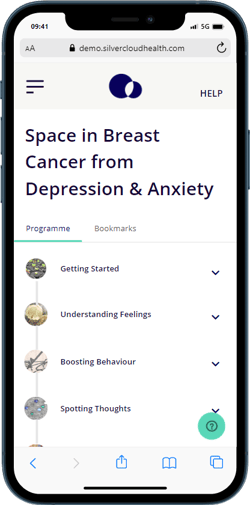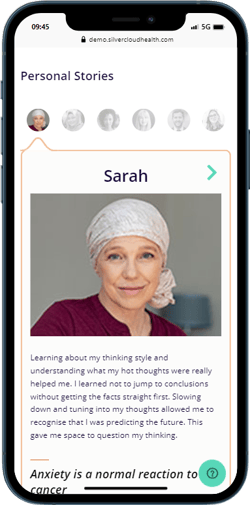According to the World Health Organisation, cancer is a leading cause of death worldwide, accounting for nearly 10 million deaths in 2020. The most common cancer cases were breast (2.26 million), lung (2.21 million), colon and rectum (1.93 million) and prostate cancers (1.41 million). Many cancers have a high chance of being cured if diagnosed early and treated effectively. Thanks to the advances in early detection and cancer treatments, survival rates are higher, and people are now living longer.
People who received a cancer diagnosis are at heightened risk of developing anxiety, mood, and substance abuse disorders, which can adversely affect their survival and quality of life (1). Depression and anxiety are the most commonly diagnosed psychological disorders in cancer survivors (2). However, cancer treatment centres often solely focus on monitoring and treating physical health symptoms. The fact that the mental health needs of people often receive little attention presents a significant global challenge.
In recent years, addressing depression and anxiety among individuals living with and beyond cancer has become a priority in both clinical practice and research (3). In a previous blog, we described how and why we developed an internet-delivered cognitive behavioural therapy (iCBT) programme to reduce depression and anxiety in breast cancer survivors. Our programme aims to help individuals learn and practice strategies and techniques to actively counteract cancer-related distress. The Space in Breast Cancer from Depression and Anxiety programme consists of 7 modules and the module content is presented below.


Scientific evaluation of our Breast Cancer programme
In our recent publication in a peer-reviewed journal, we describe the details of the scientific evaluation of the Space in Breast Cancer from Depression and Anxiety programme. In this study, we conducted a randomised controlled trial with 72 breast cancer survivors to investigate whether a programme specifically tailored for breast cancer survivors is effective in reducing their depression and anxiety. We compared the breast cancer programme recipients against a treatment-as-usual control group on depression and anxiety at post-intervention and 2-month follow-up. The programme’s effects were also evaluated on secondary outcome measures of quality of life, fear of cancer recurrence, active and avoidant coping and perceived social support. Intervention participants received weekly guidance and post‐session feedback from a non-clinician supporter over 8 weeks. Treatment-as-usual group continued their usual care recommended by their healthcare team.
Our results showed that survivors who received the intervention had significantly lower depression and anxiety scores 2-months after the intervention had ended. The engagement was high, survivors logged in approximately 16 times and spent 4 hours and 20 minutes in the programme. Intervention participants also had a trend indicating improvements in their quality of life and decreases in the use of avoidant coping from pre-intervention to 2-months after the intervention completion. It is important to highlight that these results were achieved with weekly non-clinician post-session feedback.
The positive findings demonstrate that iCBT programmes can address the mental health needs of increasing number of cancer survivors. Implementing such interventions tailored to the needs of populations living with and beyond cancer can increase the access to mental health care and meet the needs of the majority of survivors at lower costs. The integration of these interventions in primary health care can help reserve resource-intensive interventions for those most in need and prevent longer term depression and anxiety among cancer survivors.
References
- Zhu J, Fang F, Sjölander A, Fall K, Adami HO, Valdimarsdóttir U. First-onset mental disorders after cancer diagnosis and cancer-specific mortality: a nationwide cohort study. Ann Oncol. 2017;28(8):1964–9.
- Mitchell AJ, Ferguson DW, Gill J, Paul J, Symonds P. Depression and anxiety in long-term cancer survivors compared with spouses and healthy controls: a systematic review and meta-analysis. Lancet Oncol. 2013;14(8):721-732
- Niedzwiedz, C.L., Knifton, L., Robb, K.A. et al.Depression and anxiety among people living with and beyond cancer: a growing clinical and research priority. BMC Cancer 19, 943 (2019). https://doi.org/10.1186/s12885-019-6181-4
- Akkol‐Solakoglu S, Hevey D. Internet-delivered cognitive behavioural therapy for depression and anxiety in breast cancer survivors: results from a randomised controlled trial. Psychooncology. 2023;1‐11. https://doi.org/10.1002/pon.6097







